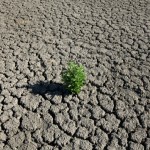Taking a Deeper Look at the Texas Supreme Court’s Ruling on Water

Photo by Mose Buchele/StateImpact Texas
Andrew Sansom is the Executive Director of the River Systems Institute at Texas State University.
Timing is everything, and the Texas Supreme Court’s recent decision on groundwater rights is no exception.
After two years of nail-biting and speculation by land owners, conservationists, policy experts and a small army of lawyers, the ruling came down Friday afternoon. Andrew Sansom, director of the River Systems Institute, was attending a water law conference in San Antonio at the time. “It was like a bomb went off in the middle of the conference,” he says. All those carefully-prepared presentations suddenly seemed pretty out-of-date.
“The ruling, in my judgment, is the poster-child for the term ‘game changer,'” Sansom tells StateImpact Texas of the decision in Edwards Aquifer Authority V. Burrell Day and Joel McDaniel.
Exactly how it will change the game is what everyone is trying to figure out. The case clearly established two things. First, that landowners legally own the groundwater underneath their land, and second, that landowners may be owed compensation if state or local regulations go too far in limiting the amount of groundwater landowners can pull.
Beyond that things start to get a little murky.
“The court didn’t lay a bright line test as to what is too much in terms of a rule, how strict is too strict [when it comes to regulation]. It didn’t say. It sent this back down to the district court,” Tom Mason, former LCRA head and current attorney tells StateImpact Texas.
That leads Mason and others to expect that the ruling will provoke a flood of lawsuits.
“I suspect we’ll see quite a bit of litigation where trial courts [and] the state district courts hear these cases [and] issue their opinions. Many of them will get appealed to courts of appeals, and maybe get appealed to the Texas Supreme Court,” predicts Mason.
That process may ultimately clarify what type of regulation will warrant compensation for landowners. It could also hinder conservation efforts in a time of drought.
The logic goes like this: If groundwater districts fear that their regulations will provoke costly lawsuits, or expensive restitution to landowners, they’ll be less likely to regulate how much groundwater property owners can use.
“These little groundwater conservation districts are already underfunded, so I can’t imagine that they wont put their heads in the ground when faced with the possibility that they will have to compensate landowners if they curtail their use of water,” says Sansom of the River Systems Institute.

Photo courtesy of to Tommy Holt, Thirdeye Photography.
Tom Mason currently works as an attorney with Graves Dougherty Hearon and Moody.
And the ruling may complicate relationships among landowners themselves.
“Where you stand depends on where you sit I guess,” says Mason. “Depending on whether you’re a land owner who has a well who wants to sell water to a city that needs it, or if you’re a landowner who’s afraid that your well is going to grow dry, because your neighbors well is going to produce water that’s going to be sold to someone [else] during the drought.”
But many property owners don’t see it that way.
A Seat at the Table
“I don’t think you’re going to see a flurry [of lawsuits],” Jay Evans, Vice Chair of the natural resources committee for the Texas and Southwestern Cattle raisers Association tells StateImpact Texas.

Photo by Mose Buchele/StateImpact Texas
Jay Evans is with the Texas and Southwestern Cattle Raisers Association. He says the ruling is good news for landowners.
“It’s not that easy. You don’t just pick up the phone and say ‘Send me a check,'” says Evans. “And the expense that the litigation costs [is great], so I think a person would have to be pretty sure that they’d been damaged.”
A Texas law that says plaintiffs have to pay the damages to groundwater districts if their case is without merit will also discourage litigation, Evans adds.
Instead, agricultural groups believe that the ruling will give them a stronger hand as Texas begins to implement long term water planning.
“There’s no question that the demand for the water is going to come from the urban areas, just look at the growth,” says Evans. “The demand is going to shift. It’s really important that agriculture be at that table and be one of those stakeholders,” he says. “That together agriculture and the urban areas work together in order to establish a long term plan. I think this ruling will enhance that process.”
It’s not just farming and ranching groups that see some benefit to the ruling.
“There are pros and cons,” Laura Huffman of the Nature Conservancy tells StateImpact Texas. “The nature conservancy is a private landowner, we understand the value of private property rights. But there is also an overarching issue that we’ve all got to think about, which is that water is essential to all life.”
Huffman says landowners’ greater claim to the state’s limited water supply will complicate long term planning.
“The state is counting in its water plan on 25 percent of the water to come from conservation.” she says. “Now, with groundwater, how do you incentivize private landowners to reduce their use of this resource?”
But there’s another aspect to the ruling that may help conservation efforts.
Historic Use
Groundwater permits in Texas are issued on the basis of historic use. That means that water users who have traditionally pulled groundwater from an area are allowed to take more of it based on their past amount of consumption. Huffman believes that’s counterproductive when it comes to conservation.

Photo by Mose Buchele/ StateImpact Texas
Laura Huffman is the Texas state director of the Nature Conservancy.
“During times of drought, it might have created a disincentive for you to cut back your water usage, because you’re trying to protect that amount of water that you used historically, so that you don’t deplete your right to your water.”
But the ruling threw that out the window, something Huffman and other commentators think could be a benefit to conservation.
“I think it’s really important from a conservation standpoint, that we know we own that water under that surface and we wouldn’t have to do anything adverse in order to protect that right,” says Evans with the Cattle Raisers Association.
Oil and Water
If the ruling changed precedents in some ways, it reinforced them in others, much to the chagrin of many who study the science of water.
By deciding that water is the property of landowners, the court was resting on an established Texas legal framework that considers water resources in the same way as the state’s oil, gas and mineral deposits. The problem is that water works differently from fossil fuels, says the River Systems Institute’s Andrew Sansom.
“The difference is that oil and gas does not come out of the surface and flow downstream, where it has already been allocated sometimes to cities or citizens for hundreds of years,” says Sansom. “We really can’t draw that analogy scientifically.”
Instead, scientific advances in hydrology have shown that groundwater and surface water are, essentially, the same thing. The only difference is how they are managed by the state.
“The water in our rivers and lakes is thought to be a property of the State and it is allocated by permits by the Texas Commission on Environmental Quality,” Sansom says. “That is completely inconsistent with the notion that the water underground, which is the same water, belongs to private citizens, and the state simply can’t have it both ways.”
Sansom believes that disconnect between law and science will force the Texas legislature to overhaul the state’s water management laws in the light of the new court ruling.
“It creates an irreconcilable disconnect, and I believe our best days are ahead, and this will force us to figure out a way to resolve it,” says Sansom.


